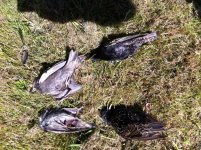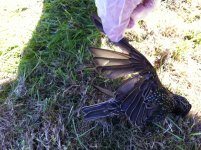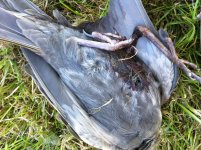We have around 20 starlings - adults and their young - feeding in our back garden this week. All going well until an hour ago when we came back from the shops we found four dead - 2 adults and 2 juvenilles, at various places in the garden. I have contacted the BTO to see the likely cause. Any clues?
We have sparrowhawks come now and again - probably see one about once a month. They were all sunning themselves on the lawn this morning, but it seems strange that if it was a sparrowhawk surely he would take them away?
A horrible sight to see and it's made us wonder if we should have a bird feeding station out there at all now.
We have sparrowhawks come now and again - probably see one about once a month. They were all sunning themselves on the lawn this morning, but it seems strange that if it was a sparrowhawk surely he would take them away?
A horrible sight to see and it's made us wonder if we should have a bird feeding station out there at all now.








